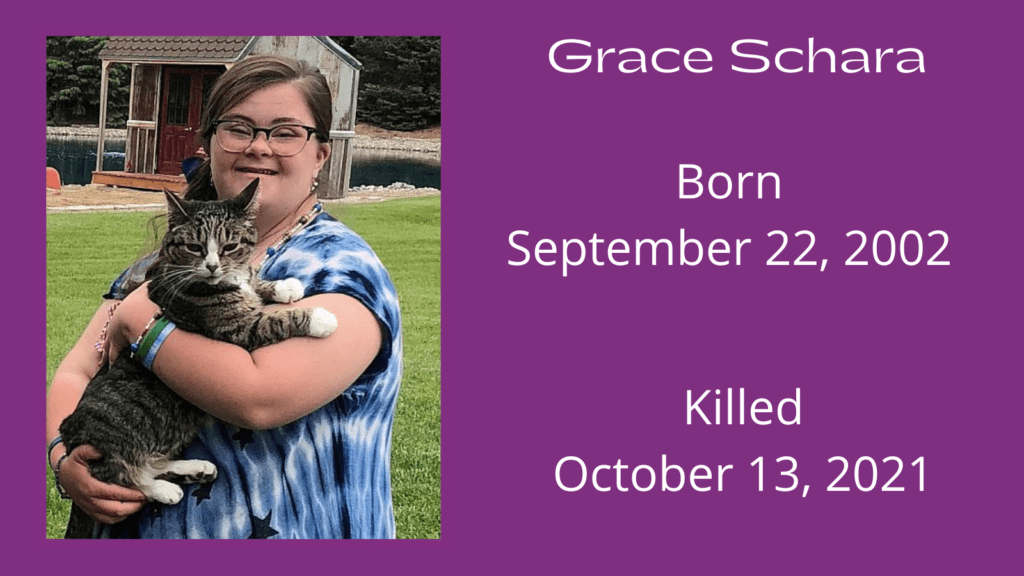Hospital Continues to Conceal Facts
FREEDOM, WISCONSIN, May 18, 2022 — An investigation into nearly 950 pages of medical records recently received by the Schara family indicate a “smoking gun” in the hand of Dr. Gavin Shokar, MD, after Grace Schara needlessly died.
Grace Schara, a 19-year-old girl with Down Syndrome, was given a dangerous combination of medicines on her last day at St. Elizabeth’s Hospital (Ascension) in Appleton, Wis., in what could be seen as an effort to ensure her death. Shokar ordered a maximum dose of Precedex, a powerful sedative used for surgery or procedures, at 10:48 a.m. on the morning of Grace’s death. At 10:56 a.m., a mere eight minutes later, he submitted a do-not-resuscitate (DNR) order in the system, without consulting family. Shokar not only gave Grace a maximum dose of a dangerous sedative, but he also sealed her fate through the DNR.

In fact, due to this DNR order, dozens of medical personnel were content with allowing Grace’s death, despite verbal pleas from family to resuscitate her. A DNR order is legally required to be discussed with family and consented to in writing, neither of which occurred in Grace’s case. Grace was not given a DNR bracelet, which is also required by law. In the State of Wisconsin, such verbal commands supersede DNR orders, but St. Elizabeth’s demonstrated they don’t adhere to common ethical practices nor laws.
“Why would a DNR be ordered eight minutes after a powerful sedative is administered?” asked Scott Schara, Grace’s father. “Why didn’t Dr. Shokar tell us he was giving Grace sedatives and that he put the DNR into the system? These are the actions of someone, I believe, who knew what outcome would materialize from his actions. This isn’t the method used by someone trying to save a patient’s life.”
The use of Precedex began four days prior without medical necessity nor informed consent. The family had an advocate either present or available by phone at all times, and insisted on knowing what Grace would be given. It appears Shokar, as well as other medical personnel, like Hollee McInnis, RN, an experienced ICU nurse, deliberately concealed this information from the Schara family.
On October 13, 2021, Grace’s last day, not only was the maximum dose of Precedex given, it was followed up 37 minutes later with Lorazepam, another sedative used for anxiety or insomnia. Grace was already unconscious before Lorazepam was administered, which begs the question as to the need of an anxiety drug being ordered in the first place. Grace’s unconscious state continued throughout the day, when two more doses of Lorazepam were given three minutes apart, at 5:46 p.m. and 5:49 p.m., respectively.
Finally, 26 minutes later, an IV-push of Morphine was administered. Just over an hour later, Grace was declared dead.
Morphine is an opioid pain medication which can slow or stop breathing resulting in death, especially when combined with other sedative medications, according to the black box warning on the drug insert, which states, “Concomitant use with benzodiazepines [Lorazepam] or CNS depressants [Precedex] may result in death.”
A doctor who reviewed Grace’s records stated, “Each of these meds on their own, have an increased risk of serious or life-threatening breathing problems and cardiac arrest, and there’s an additive effect when used in combination. To use them like they did in a person with a diagnosis of acute respiratory distress is beyond believable as to intention.”
The package insert for morphine also requires the reversal drug to be “immediately available,” and for staff to monitor the patient. No medical staff stepped foot into Grace’s room after the Morphine was injected, until after Grace died.
After requesting all of Grace’s medical records, Scott learned that St. Elizabeth’s (Ascension) withheld nearly 950 additional pages, which they only recently released to him. He believes there are more records they have yet to provide that could further implicate them.
Many hospitals are committed to following deadly treatment protocols encouraged by governmental agencies, and receive financial benefits and incentives for doing so. Schara’s case highlights many abuses, along with the dangers of financial influence. For more information about Grace’s story, please visit www.ouramazinggrace.net.
To book Scott Schara for an interview, please contact Kevin Tuttle at kevin@ouramazinggrace.net.
###
Kevin Tuttle Director of Public Relations 608-630-7668 www.ouramazinggrace.net Our Amazing Grace ™

